If you’re wondering what it’s like to be a digital nomad living in Turkey, you’re not alone. You’re making a very popular choice and, in all honesty, I can’t blame you. Turkey is a fantastic country with amazing scenery, culture, food, history, and friendly locals. But, before you make your final decision, it’s best that you know as much information about what it could be like, as possible.
I lived in Turkey for several years, and I still visit regularly to see my husband. I’ve noticed a real boom in the number of remote workers choosing to relocate to different parts of the country; making it a hotspot for this coming year. To help you decide whether or not this move is for you, this digital nomad guide to Turkey will tell you everything you need to know.
About Turkey


Turkey is a huge country that sits between Europe and the Middle East. Many people think that Istanbul is the capital city, but that title belongs to Ankara. Istanbul is, however, by far the largest city and one of my favorite places in the whole world. According to recent statistics, an estimated 16,047,000 people live in Istanbul alone.
But it’s not all about Istanbul, because there are some amazing towns and cities to visit, including vibrant Izmir, Ankara itself, and Antalya to name just a few. The south coast is definitely where it’s at during the summer months thanks to the many amazing beaches to chill out on. But, for me, the best things about Turkey are its wonderful blend of old and new, and the friendliness of the people – you won’t struggle to make friends.
There’s no shortage of things to see and do across Turkey. This is a country with a huge amount of history and countless archaeological sites to explore. Of course, there’s also the food to try; I guarantee you’ll fall in love with all the different kebabs and street food.
Living in Turkey As a Digital Nomad


Over the last few years, Turkey has become a great spot for remote workers, and you’ll find many work-friendly cafes and coworking spaces in large towns and cities. Internet across the board is generally high quality, although I do find that using my phone as a hotspot works better than the WiFi in some places.
The most popular places for digital nomads are Istanbul, Izmir, Fethiye, Antalya, and Bodrum. However, you’ll find remote workers pretty much all over the country. Other than in the east and southeast, which tend to be more traditional and rural areas, it’s easy to meet other like-minded people and network if you choose.
Turkey also has a relatively low cost of living, which I’ll talk about in more detail a little later. While finding accommodation can be a bit tricky, there are many options for sharing rooms with other remote workers, and the cafe vibe/nightlife scene is fantastic for getting out there and enjoying your time off.
Life in Turkey is pretty chilled out, except for the heart of Istanbul which is always incredibly fast-paced. Yet, even there, there’s something electric and exciting in the air. As a digital nomad in Turkey, you won’t struggle to find a hidden gem or tourist hotspot during your downtime.
Is Turkey Safe?


As a potential digital nomad in Turkey, you’ll certainly want to know whether or not it’s safe before you make a choice. I’ll tell you from personal experience that I never felt unsafe in Turkey, even in Istanbul. However, that’s not to say that you don’t need to use your common sense, especially in large cities, and definitely in Istanbul.
Don’t walk around on your own at night, avoid bringing valuable items with you when you’re out and about, and dress conservatively if you feel the need to do so. It’s about following your gut and simply being careful, just like anywhere else in the world. However, do be cautious if you’re in Beyoğlu, Istanbul at night, as it’s known for pickpockets, scams, and generally all the things you want to avoid.
Despite that, Turkey is a safe place, and even before I met my husband, I never had a problem when I was walking around on my own. One thing you should avoid however is protests; if you see any large gatherings, just walk the other way – you never know how they may turn on a dime.
Best Places to Live in Turkey


Working remotely in Turkey isn’t a difficult experience, and it’s certainly an enriching one. However, it does depend on where you choose to base yourself. To help you out, I’ve come up with a list of the best places to live while working remotely.
1. Istanbul
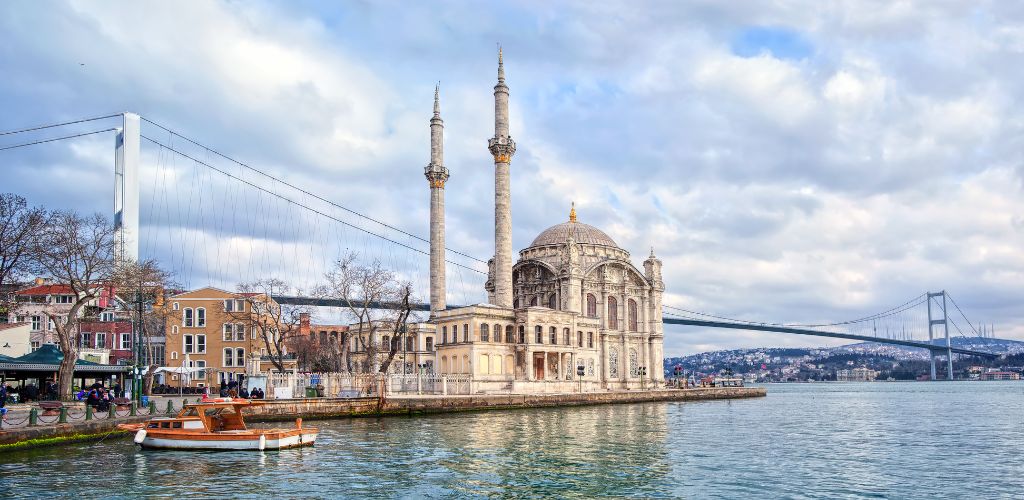

Istanbul is Turkey’s biggest city by far, and it’s a vibrant place that has a wonderful blend of ancient and modern. It’s also the only city in the world that straddles two continents, connected by the huge Bosphorus Bridge. There are many great places to stay, and you’ll find plenty of traditional spots to visit here, amazing history, great food, and some of the best nightlife in the country.
I may be a little biased because Istanbul is my favorite place, but you don’t have to just take my word for it; there are so many digital nomads who call this place their temporary home. There are tonnes of coworking spaces and some great cafes; you can even sit outdoors in a park during the summer months and get some work done with an amazing view.
The vibe across the board is friendly and welcoming, and you’ll meet plenty of people, both local and international. The only downside of Istanbul is that it’s immensely busy; I’ve never seen traffic like it in my life. But, when you push that part aside, there are only advantages left to consider.
Best Areas to Live in Istanbul


Istanbul is huge, and it’s hard to pinpoint where the actual center is, although the general consensus is Taksim, with Sultanahmet noted as the historical center of the city. Staying in Taksim isn’t the best idea, simply because it’s packed with noise—nightclubs often play loud music until around 6 am—and it’s more expensive because of its attraction. However, there are some areas not so far away that provide a more authentic vibe while still being within easy reach.
For me, Beşiktas is the best place for digital nomads. I like the feel of this neighborhood—it feels local but still offers plenty of great attractions, and it’s a little cheaper than some of the other more central parts. You’ll also find some great coworking spaces here, and it’s very easy to get the ferry over to the Asian side and Uskudar and Kadiköy, which are other great areas for remote workers.
Beyoğlu is the closest area to Taksim and extends down to Karaköy and Galata. You might find life slightly more expensive in this area, but if you can share with another digital nomad, you’ll find plenty of fantastic cafes to work from. Then we have Fatih, which is close to Sultanahmet and the most historical part of the city. There are some cheap Airbnbs to be found in this area and a much more traditional way of life, which may call out to you.
Coworking Spaces in Istanbul


As a digital nomad in Istanbul, you’ll find some solid coworking spaces to choose from. Here are three of the best:
- Workinton, Nişantaşi: Located close to the center of Beşiktaş, this popular and vibrant coworking space is the ideal place to meet other digital nomads.
- Galata Business Center, Beyoğlu: With a branch on busy Istiklal Street, this is the best place to combine shopping, a bit of sightseeing, and some work at the same time.
- CoBAC, Eminönü: CoBAC is one of the most popular coworking spaces, and it’s located just over the Galata Bridge, so you can enjoy history while you work.
Things To Do in Istanbul
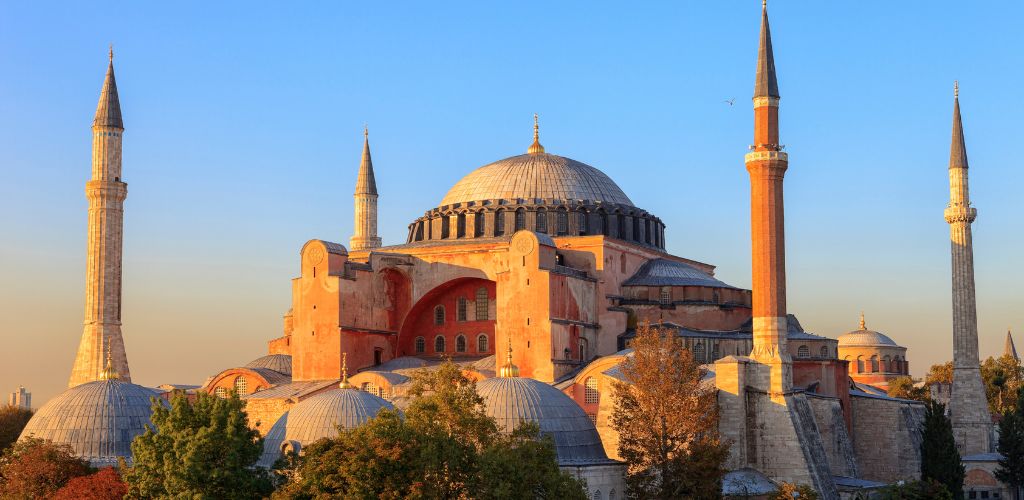

There is a ridiculous amount of things to see and do in Istanbul, but these should definitely be on your list.
- Dolmabahçe Palace: Within walking distance of Beşiktaş, this palace is so opulent, it will blow your mind.
- Hagia Sophia & Blue Mosque: I’ve grouped these two because they’re next door to one another. If you want to see some history, be sure to head to Sultanahmet and check out these two famous spots.
- Topkapı Palace: Another of Istanbul’s Ottoman palaces, Topkapı has one of the most stunning views over the Golden Horn and is completely breathtaking on the inside.
2. Izmir
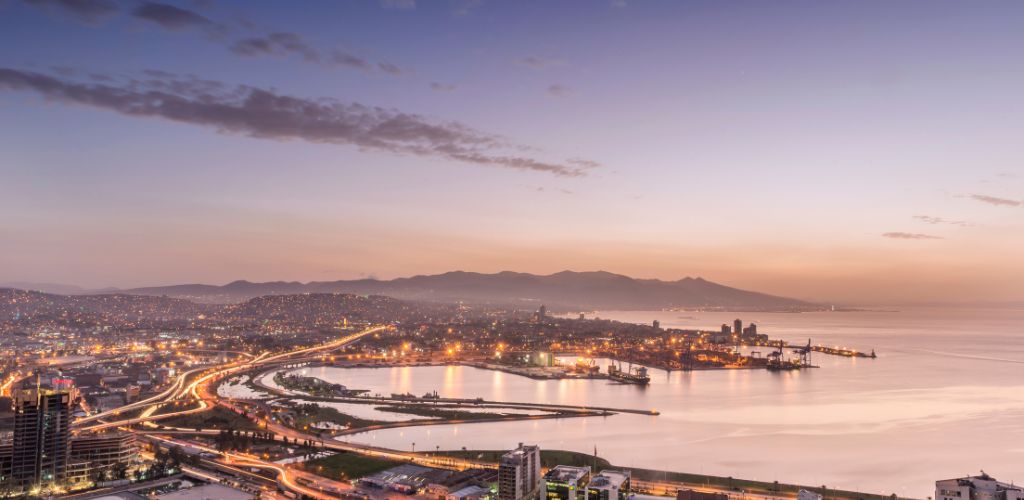

Living as a digital nomad in Turkey will likely cause you to look toward Izmir, and that’s no surprise. Izmir is a vibrant, youthful city that has a real cosmopolitan feel. Despite that, there are countless ancient ruins around it, including one of my favorite spots—Ephesus.
Located on the west coast, Izmir is lapped by the warm waters of the Aegean, and being a large university city, it’s got a busy and eclectic vibe. I think Izmir is one of the best places in the country for shopping, thanks to its amazing malls and great bazaars, including the famous Kemeraltı area.
Life as a remote worker in Izmir is made easy by plenty of coworking spaces and cafes, and an outdoor living style during the long summer. It’s easy to get around, and it’s a particularly walkable city, with plenty of opportunities to meet other expats and remote workers.
Best Areas to Live in Izmir


The three best areas in Izmir for digital nomads are Konak, Bornova, and Alsancak. These are all quite central and are linked by buses, however, you can easily walk from Konak to Alsancak in around 20 minutes at a moderate pace. During the summer months, it’s quite pleasant to walk around the city – the walk between these two areas along the coastal promenade is one of my favorites.
Alsancak is a lively area that has some of the best nightlife; this is the part of Izmir I liked the best. You won’t find many coworking spaces in this area, but there are more than enough great cafes to spend a few hours, or you could sit outdoors under a shady tree and check out the view. Konak is a little quieter, and there are some coworking hubs around this area, but again, I much prefer to enjoy the cafe vibe, and it’s a great spot to connect with other remote workers.
Bornova is a little further away from these two areas, but it’s a university area with a youthful vibe, and you’ll find a lower cost of living in terms of eating out and nightlife. Again, there are plenty of cafes to work from, and if you like shopping malls, this is the main area in the city for splashing the cash.
Coworking Spaces in Izmir


The coworking scene in Izmir is growing. Here are a few of the best spots I’ve found.
- Withco Coworking: Withco is a popular coworking spot between Konak and Alsancak that offers daily passes. You will need to reserve your spot ahead of time, but you’ll get your own desk and unlimited refreshments throughout the day.
- Originn Coworking: Set in busy Bornova, Originn is another high-quality coworking spot that offers different passes depending on your needs. The price is a little lower than Withco, but the space isn’t quite as large.
- Lokasyon Coworking: The only downside of this Bornova coworking space is that the staff don’t speak the best English and the website is all in Turkish. However, once you get past that, I found this to be a great coworking spot.
Things To Do in Izmir


I enjoyed the outdoor feel of Izmir, and the mild winters in this part of the country mean it’s always possible to spend some time outside. Here are some of the best things to do with your days off in Izmir.
- Ephesus: This is my number one recommendation when you’re anywhere near this area, and it’s an ancient city that will blow you away. There is no better way to spend your day off.
- Shopping in Kemeraltı: At the far end of Konak you’ll find Kemeraltı market. It’s the ideal place for haggling, trying different foods, and grabbing some bargains.
- Walk the Kordon: The waterside promenade between Alsancak and past Kemeraltı is a great free thing to do when you have some spare time. I love how calm it is; even though it’s in the middle of a city, it has a super relaxing vibe to it.
- Visit Çesme: Around an hour away from Izmir you’ll find the beautiful beach town of Çesme, which makes for the perfect day trip. I think the beach here is one of the best in the country, and the seafood is divine.
3. Fethiye


If you want a laid-back beach vibe within close reach of some of the most stunning natural sights possible, it has to be Fethiye. Hands down, this is one of my favorite places in Turkey, and many digital nomads agree with me as it’s become a magnet for remote workers over the last few years. It’s not surprising at all once when you witness the stunning views here.
Fethiye is a small city that extends outward to include several beach resorts, including Ölüdeniz, Hisarönü, and Çalış. However, Fethiye itself has some great beaches if you want to stay in the center of the city. It’s a very digital nomad-friendly area, most people speak English, and I found the internet to be high quality. Plus, days off spent at the beach are a literal dream come true.
While accommodation in Fethiye may cost a little more than in some other areas, particularly if you try to stay in the center of Ölüdeniz, it’s possible to find some low-cost Airbnbs, and it’s still cheaper than most of Europe. Fethiye has very hot summers and mild winters, making it a year-round spot to meet countless other travelers, digital nomads, and holidaymakers.
Best Areas to Live in Fethiye
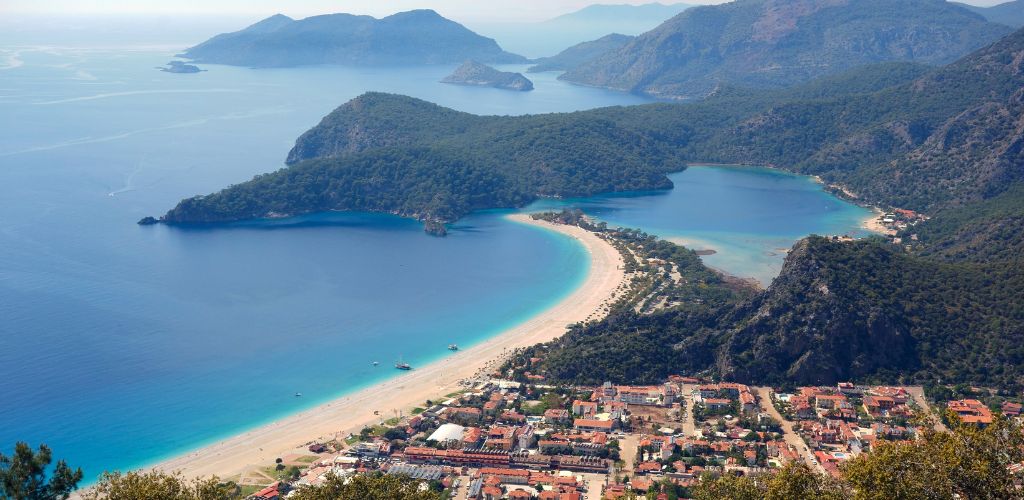

The Fethiye area is quite large, which means there are plenty of neighborhoods to choose from. Ölüdeniz is my favorite part of this area, hands down, but it’s also the most expensive and therefore not a good idea to base yourself there. I recommend basing yourself nearby and visiting regularly – it’s truly beautiful.
The central part of Fethiye itself is a good place to stay as it’s close to nightlife, beaches, and shops, and you’ll find some good Airbnb options. Hisarönü is another good option and here, you can often find villas on Airbnb for a reasonable price. Local buses run over to Fethiye City and down to Ölüdeniz frequently from here, and there are plenty of bars and restaurants for nightlife if you choose.
Another option is Çalış. This is a beach area which is packed with hotels and B&Bs. Again, you’ll find Airbnbs for a good price, but you might also find another digital nomad to share with as this is a particularly popular area for remote workers. You can easily get over to Fethiye and buy supplies from the bazaar while still enjoying the beach on your days off.
Coworking Spaces in Fethiye


Fethiye’s coworking scene is slowly growing, and there are a couple of great quality spots to try. However, you won’t struggle to find suitable cafes, many beachside, to work from.
- Lokal: Located in the center of Fethiye City, this popular coworking space offers a modern place to work and several membership options.
- Hipokampus: This is another popular spot for digital nomads, and it has an enviable seafront location, meaning you get a great view while you’re working – talk about motivation.
Things To Do in Fethiye


The Fethiye area is famous, and there’s no shortage of things to see and do. Personally, I’d head to the beach with every spare second, but if you want to see some of the most popular spots, here are some of my recommendations.
- Blue Lagoon: I love this stunning beach, and while it can get extremely busy during the summer months, don’t let that put you off. You can even parasail over it if you’re feeling adventurous as Ölüdeniz is one of the top spots in the world for the sport.
- Butterfly Valley: A boat trip to this beautiful island will only take two hours of your time, and it’s a great way to enjoy the beauty of the area and soak up the sun.
- Kayaköy: The beautiful yet abandoned village of Kayköy is a short distance away from Fethiye, and although you’ll need comfortable walking shoes for this one, it’s a stunning location to explore.
- Saklikent Gorge: If you’re visiting Fethiye in the heat of summer, I’d highly recommend heading to Saklikent Gorge. Not only is it beautiful in nature, but the temperature is always lower deep in the canyon; making it an ideal spot to cool off.
- Lycian Way: The Lycian Way is a long-distance hike between Fethiye and Antalya, taking you through some of the most important parts of ancient Lycia. There are many ruins en route and some great little guest houses to stay in.
4. Antalya


Life as a digital nomad in Turkey doesn’t get much better than it does in stunning Antalya. This is a huge city and province that’s lapped by the glittering Mediterranean and experiences up to 13 hours of glorious sunshine per day during the hottest month of July.
I was a little confused about where to go when I first looked at Antalya, so make sure you know whether you want to go to the city itself or whether you’re looking to head to a beach resort. Some resorts in the province include Alanya, Belek, Lara, Kemer, and Manavgat. For me, the beaches in the Antalya region are some of the best in the world, not just Turkey, and it’s a very easy area to travel around.
The city of Antalya is a wonderful place to base yourself as a digital nomad and you can easily venture out to the nearby resorts from here. Konyaaltı Beach is a huge, sweeping area where you’ll meet people from all over the world and I loved walking around the old castle area and drinking Turkish coffee.
Best Areas to Live in Antalya


Konyaaltı is the beachside part of the city, and there are some great hotels and hostels in this part, however, rental prices are higher here, as well as in the historic Kaleiçi area. The good news is that you may find another digital nomad to share with. I liked the Konyaaltı area because I could wander down to the beach whenever I had some spare time, and you’ll come across lots of like-minded people around here.
Another beachside option is Lara, which is where a lot of the huge hotels are based. Despite that, there are many Airbnbs, and you can often find a cheaper deal if you’re staying for longer. Lara is within walking distance of the center of Antalya, toward the Kaleiçi side, and is a great place to visit on a sunny day—of which there are plenty!
A couple more residential options are Döşemealtı and Muratpasa. I liked Muratpasa because it had a much more “homely” feel, however, it’s quite far from the beach, and you’ll need to use taxis and buses if you want to go to the city center. Döşemealtı is a good choice for those who like the countryside and outdoor spaces; there are some great hiking spots, and I enjoyed the more traditional feel.
Coworking Spaces in Antalya


Antalya has a thriving coworking scene, and there are quite a few to choose from. I found the daily and monthly pass prices to be a little higher than in Fethiye or Istanbul, but they’re good quality spots regardless. Here are three of the best.
- Work C: This is a very popular coworking space in the center of Antalya, and it offers a modern and comfortable environment for getting through your task list. I found the internet to be of great quality, and I could easily make video calls without any issues. They also offer free, unlimited tea and coffee.
- Creawork: Located in Muratpasa, Creawork is a great coworking spot for networking and collaborative work. Daily passes are a little cheaper than Work C, as it’s not quite as central, but it’s easy to reach with public transport.
- Mozaik: This is a great coworking space, centrally located in Konyaaltı. I spent a few days here, and it’s very close to the beach, with reasonable daily prices for both shared areas and private desks.
Things To Do in Antalya


The Antalya region is huge, and there are so many things to see and do. I’m still trying to get through them all after all these years, but there are some definite highlights to put on your list first.
- Duden Waterfalls: Between Antalya city and Lara Beach you’ll find the dramatic Duden Waterfalls. One minute you’re walking along the coastline and the next, there’s a huge waterfall thundering down- look out for the rainbows.
- Jeep safari in the Taurus Mountains: Give yourself a day off and head into the Taurus Mountains for a day of off-road fun. I had a great time on this trip, although do remember sunscreen because that sun is intense.
- Visit Alanya: Just under two hours drive from Antalya is the coastal resort of Alanya and it’s one of my favorite spots in the region. It’s so laid-back, and Cleopatra Beach is without a doubt one of the best places to spend a day in the sun.
- Explore Kaleiçi and Hadrian’s Gate: The area around the old castle is a wonderful place to explore, and I enjoyed the traditional vibe. While it can be busy around this area, it’s worth the effort, and Hadrian’s Gate is a Turkish highlight. You’ll definitely need your camera for the sweeping views over the coastline.
5. Bodrum


Bodrum has become a prestigious and sophisticated city over the last few years, and it’s not unusual to see celebrities enjoying the coastline from their private yachts.
Many digital nomads base themselves in Bodrum, however, it’s definitely an area for people with a slightly higher budget. I’ve noticed that rent in Bodrum is noticeably higher than in other large towns and cities, at around 15,000-20,000TL ($500/$670) per month, and most restaurants fall into the high-end category.
Despite that, Bodrum does have major advantages as a digital nomad hub. It has good quality internet, plenty to see and do during days off, and it has an international feel to it; making it easy to meet other remote workers. You can cut costs by eating at home, and perhaps sharing accommodation, and if you love the beachy/outdoor vibe, it’s definitely somewhere for you.
I like Bodrum for its exclusive feel, but it’s not somewhere I would think about staying for more than a few months. However, during the summer, it’s a great base for beach lovers, and there are plenty of day trip locations within easy reach.
Best Areas to Live in Bodrum
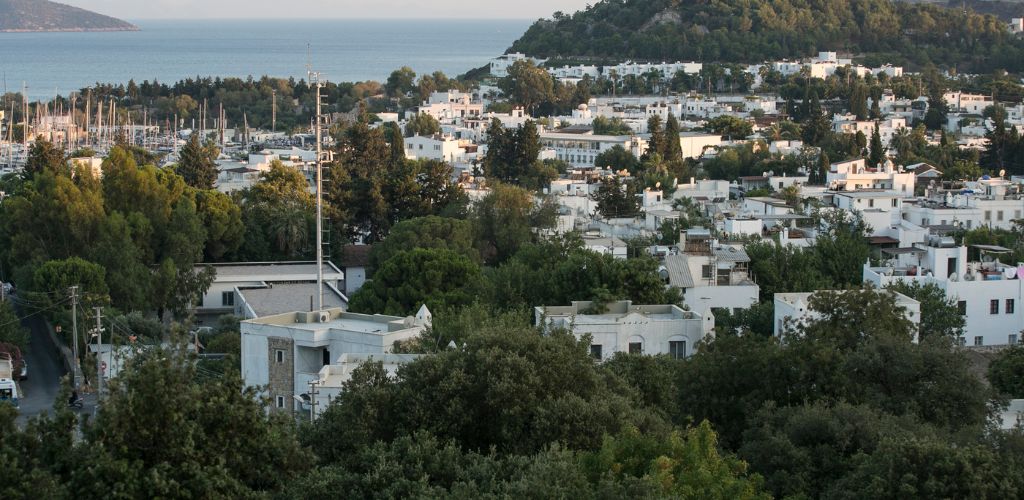

Living in the center of Bodrum, or nearby Bitez, isn’t ideal for digital nomads unless you don’t mind spending a fortune on overpriced hotels and villas. However, there are a few smaller areas just outside the main center of town that are ideal for cutting costs and are still very accessible by car and bus.
My favorite part of Bodrum is Konacık, and it has quite affordable housing options if you’re willing to search. Here, you’ll find a slower pace of life, and while the center isn’t far away, it’s less focused on tourism, and more on day-to-day living. The city center is only ten minutes away, and there are some cute cafes to spend your days working if you want to get out of the house.
Another good option is the beach resort of Gümbet, just ten minutes away from Bodrum, and a lot cheaper. Here, you’ll find some affordable Airbnbs and hotels, and the beach is beautiful. Nightlife around here is a lot more laid-back and less “uptight” than Bodrum city center, and again, more affordable.
Coworking Spaces in Bodrum


Bodrum’s coworking space is in its infancy, but there are a couple of notable areas to head to if you want to network and get out of your accommodation for work. The low number of coworking spaces isn’t an issue, however, as there are more than enough cafes that are suitable to work from.
- CoBodrum: You can choose daily, weekly, or monthly packages at CoBodrum, and there are fixed desks or shared networking areas to choose from. This is a new space that’s still establishing itself, but it’s become quite popular over the last year or so.
Things To Do in Bodrum


Life in Bodrum is mostly about summer fun, and that means spending time outdoors and soaking up the sun. However, the winters around this area are surprisingly mild, with an average temperature of 13°C/55°F in December. Here are some of my recommendations.
- Museum of Underwater Archaeology: For me, this was a major highlight of Bodrum, and I’d definitely go back again. The museum is inside Bodrum Castle, and it’s packed with artifacts from the coastline around Bodrum and the neighboring Aegean.
- Bodrum Castle: Even if you don’t go into the museum, the views from Bodrum Castle are truly breathtaking. I’d recommend you clear down your camera for this one; you’re going to need it.
- Gümbet Beach: Bodrum itself doesn’t have ‘full-on’ beaches, and they tend to be rocky. However, ten minutes away, in Gümbet, you’ll find a beautiful sandy beach with plenty of amenities for the perfect day off.
- Take a Boat Trip: Bodrum’s coastline is stunning, and a lazy day boat trip is the perfect way to appreciate it. What better way to spend a day off?
- Go Diving: Around 15 minutes away from Bodrum, you’ll find the Big Reef, which is a famous dive site in the area. Here, you’ll find all manner of colorful marine life, and it’s a popular spot for less experienced divers.
How to Find Accommodation in Turkey


Now, I’m not going to lie, finding accommodation in Turkey is probably the hardest part of being a digital nomad. Many landlords won’t rent for less than 12 months, and even then, they want the full year’s rent upfront. However, life in Turkey doesn’t have to be that hard; here are some tips on finding somewhere suitable to stay.
1. Airbnb: I think the best option is Airbnb because you can find somewhere homely and therefore cut costs, and it’s often possible to negotiate a lower price for longer stays. All of the locations I’ve talked about in this guide have a large range of properties on offer.
2. Booking.com: You can find some great value hostels and B&Bs on booking.com, and there are also serviced apartments on offer. Again, most of the mentioned destinations have a range of properties available on the site, and the plus point is that you can read reviews.
3. House-sitting: While house-sitting isn’t a huge ‘thing’ in Turkey, you’ll certainly find some assignments in Istanbul. This is a good way continue your usual nomad lifestyle, while having a roof over your head, and if you’re clever, you can line up your house-sitting assignments over a period of time. My go-to site is TrustedHousesitters.
4. Facebook groups: With the growing number of digital nomads in Turkey, there’s no shortage of Facebook groups dedicated to each location. These are good places to look for possible people to share with and to find advertisements.
Cost of Living in Turkey


While the cost of living in Turkey has increased over the last few years, it’s still lower than most other European countries. I found I could have a relatively good standard of general life without splashing the cash, and as with all things, it’s possible to cut costs without sacrificing too much, if you’re sensible.
Prices do vary depending upon where in Turkey you are, and even in which neighborhood of a specific city, but I’ll give you a general idea below of what you can expect.
Restaurants and Groceries


I’d always recommend cooking at home and buying fresh produce from the local bazaar. It’s also a good idea to buy your meat from a butcher rather than the supermarket, as you’ll notice a big price difference. For around 1000TL ($33) you can stock up your fridge with a week’s worth of fresh fruits and vegetables and probably still have some change.
As far as restaurants go, try and avoid the tourist traps as you’ll spend a lot more there. For instance, you can expect to pay around 1000TL ($33) for a meal and drink in an international restaurant, but you will pay around 400TL ($13) in a local restaurant.
If you want to eat traditional Turkish food, look for the words “lokanta” or “ev yemek”. If you want to eat kebabs, you’ll need to look for an “oçakbası” which is where you’ll find a large range of grilled meats and salads. A full meal in a place like this will cost you around 600TL ($20), depending on what you order.
Accommodation Costs


Accommodation is the biggest expense in Turkey and, as I mentioned earlier, it’s not easy to find an apartment to rent if you’re staying for less than a year. In this instance, you’ll sign a rental contract and in many cases, have to pay the whole year upfront. Personally, it’s not something I’d feel very comfortable doing.
Airbnbs vary in cost depending upon where you go. If you stay in Fethiye or Antalya, you can usually find a one-bedroomed apartment for around 800-1000TL per night ($26-$33), but if you stay in Bodrum, you can usually add around 300TL per night on top of that. Hotel and hostel prices vary depending on location and time of year, but you can find some good deals on booking.com.
If you can find another digital nomad to share with, you’ll certainly save money as you’ll also need to pay utility costs on top of your rent. A month’s electricity and water usually costs somewhere between 2500-3000TL ($84-$100) and will be higher if you use air conditioning during the summer.
Transportation Costs in Turkey


One of the biggest advantages of living in Turkey as a digital nomad is that it’s so easy to get around, both locally and on a wider scale. I personally wouldn’t consider driving, simply because the public transport network takes the hard work out of it and the cost of fuel can be high. Instead, use the local bus network; you can usually get a one-way journey across town for around 15TL ($0.50).
If you want to visit other parts of the country, you can choose between long-distance buses, trains, or domestic flights. The train network isn’t that extensive, but you’ll find some routes fit the bill. I found the long-distance buses a great option, particularly Pammukale buses, as they’re comfortable, cost-effective, and cover most of the country.
If you’re in Istanbul, public transport is the way to go. You simply buy an Istanbul Kart and top it up as you need to. You can travel one way on one service (ferry, bus, Metro, or tram) for 15TL ($0.50) no matter where you’re going within the network.
SIM Cards and Data


Whether you’re visiting for a short time or a longer period, there are multiple companies that offer tourist SIM packages. The best companies to go with are Turkcell, Turk Telekom, and Vodafone.
If you’re planning on staying longer, as most digital nomads will, then you simply take your passport to one of the above-named stores and purchase a SIM for your phone. This will cost you around 100TL ($3.50), and you then top up your phone with calls, SMS, and data each month.
You can use a Turkish SIM in a foreign phone for up to 180 days before it will lock. At that point, if you have a residency permit, you can pay to have the phone unlocked, however, this can be quite a costly process and at the time of writing the tax is around 6000TL ($200). A good way around this is to buy a cheap phone in Turkey and use it simply for calls and data; you can still use your regular phone on WiFi.
Money Saving Tips for Turkey


With the rising cost of living in Turkey, a few money-saving tips will come in handy. Here are some useful strategies I picked up during my time there.
- Make use of public transport: Avoiding taxis wherever possible will save you instantly. I only ever use taxis when it’s late at night or if I have no other choice. The public transport network across the whole country is high quality and using it will keep cash in your pocket, especially in Istanbul.
- Cook at home and shop at the bazaars: It’s very tempting to eat out, especially if you’re staying in a tourist resort. However, you’ll notice that your cash supplies dwindle pretty quickly. Instead, head to the loud and colorful bazaars and stock up on wonderfully fresh produce. Then, learn to cook; befriend one of your neighbors and ask them to show you how to cook delicious Turkish food—that’s exactly what I did.
- Eat local food: If you do want to eat out, go to the local restaurants rather than tourist ones. If you’re not sure where to go, ask someone local where they head to when they want to eat out. You can eat pide and lahmacun relatively cheaply, and they’re both filling dishes.
- Avoid the tourist traps: Again, tourist fun is tempting, but it’s expensive. Don’t shop in stores on the main tourist streets; head to the back streets instead, and go to the free beaches rather than the expensive beach clubs. If you want to go on a trip, book it independently instead of using excursion desks or reps.
- Book accommodation outside of the main tourist season: I really enjoy Turkey outside of the main summer months; I find July and August too stifling hot and I can’t get anything done. Most of Turkey enjoys mild winters, so think about heading there in the shoulder months or early winter to save some cash on accommodation.
Coworking Spaces in Turkey and WiFi Speed


I’ve already given you some ideas on coworking spaces to head to across Turkey’s main digital nomad hotspots, but what about the general WiFi speed? Internet quality does vary across the country; you’ll find it’s less reliable and a lot slower if you head to southeast Turkey compared to Istanbul and the south coast beach resorts. However, generally speaking, it’s still good enough to work on.
On average, Turkey has a download speed of 41.49 Mbps and an upload speed of 11.10 Mbps, according to Speedtest. When working remotely in Turkey, the internet is vital, and I never found it to be a huge problem. There were times when it dipped occasionally, but I often conducted video calls and streamed content without major problems.
Activities and Things To Do in Turkey


Living in Turkey as a digital nomad is made a whole lot more fun thanks to the huge range of things to see and do. Aside from the ideas I’ve already given you in each location section, here are some things you shouldn’t miss.
1. Mount Nemrut
Close to the city of Adıyaman, you’ll find the mysterious Mount Nemrut. This is a large mountain that you can climb, and at the top, you’ll find mysterious statues that are reputed to date back to the Commagene Kingdom in around 163 BC. I found the whole area fascinating and you’ll find some amazing food in this region too.
A tour to Mount Nemrut will show you the best of the area, and you’ll learn from a knowledgeable local guide. This is one of those areas that it’s very easy to miss out on because you don’t quite understand what you’re seeing. I definitely benefitted from taking a tour but if you want to get there on your own steam, taking a domestic flight from Istanbul to Adıyaman is the way to go.
2. Cappadocia


I look back on my visits to Cappadocia and still can’t quite believe what I saw. This is one of those places that will blow you away no matter how many times you visit, and it should 100% be on your list. Located in the central part of Turkey, Cappadocia is known for its “fairy chimney” landscapes, and it’s a famous area for hot air balloon rides.
Göreme is the central part of Cappadocia and while it’s more touristic, I’d still recommend you stay there, simply to get the best out of your visit. Again, a guided tour is a good way to drag every last second out of your stay. I didn’t realize just how big Cappadocia is, and I’d recommend at least four days if you want to see as much as you can.
Getting to Cappadocia can be tricky, but a flight from Istanbul to Nevsehir is the fastest route, with a short shuttle bus ride from there.
3. Take a Food Tour


One of the major advantages of being a digital nomad in Turkey is the food. Seriously, the food in this place is like nowhere else on Earth, and it varies from region to region. No matter where you are, try to find a food tour, preferably a walking one so you can try as much as possible.
In Istanbul, I went on the Taste of Two Continents Food Tour, and I’d highly recommend it. Gaziantep is also a foodie heaven, and if you’re into street food, definitely head there and take a tour around the markets.
Regardless of where you are, simply being brave and trying something new will show you delights you never knew existed; I used to be quite picky with food, but spending so much time in Turkey has made me more adventurous.
4. Skiing at Uludağ


During the winter months, head to beautiful Uludağ and try skiing and snowboarding. Or, if you’re like me, avoid risking a broken leg and simply appreciate the scenery with a hot chocolate in your hand instead. Uludağ is the premier ski resort in Turkey, and it’s located around an hour away from the city of Bursa.
You can also visit during the summer months, and there are some beautiful walking trails to check out. However, it’s simply more dramatic and stunning during the winter, and this is one of the best places to go if you’re seeking some peace and quiet. It’s not the cheapest area, I’ll admit that, but if you visit in November and March, you’ll save cash during the peak months.
5. Explore Ankara
Ankara is the capital city and a very cultural place to visit. Here, you’ll find a traditional way of life, and it’s not quite as touristic as some of the other large cities in Turkey. For me, that was a reason to go, and it’s a great spot for exploring history and architecture.
The most famous thing to see in Ankara is Anıtkabir, the mausoleum of Mustafa Kemal Atatürk, the founding father of the modern Turkish Republic. Ankara Castle is also a notable spot to visit, with amazing views over the city, as well as modern-day spots, such as shopping malls and amazing restaurants.
Weather in Turkey


Turkey is huge, and its weather varies from region to region, depending on the time of year. Generally speaking, the south coast experiences hot summers and mild winters, with very little rain during the summer months. It hardly ever snows and if it does, it’s only on high mountains.
For instance, you can expect an average high temperature of around 35°C/95°F during July, and 15°C/59°F in January in Marmaris. Yet in Istanbul, average highs are around 28°C/82°F in July with a drop to around 8°C/42°F in January. Toward the east of the country in Adana, you can expect average highs of 31°C/88°F in July, and 7°C/41°F in January.
In the winter months, it can snow quite heavily in the eastern part of the country and the central regions, such as Ankara and Cappadocia. Istanbul experiences some snow, usually around January only.
Pros and Cons of Living in Turkey


As with anywhere in the world, there are both pros and cons of living in Turkey. I’ve looked back over my experiences so I can tell you the highs and lows of being a Turkey digital nomad.
Pros of Living in Turkey
- Great weather: I can’t deny it; the weather is a major pull for most digital nomads, and it was one of the reasons I went to Turkey in the first place. It really is the perfect picture of summer.
- Amazing food: Turkish food is truly delicious, and whether you’re a meat eater or vegetarian, you’ll find countless dishes to try. Overall, Turkish cuisine is pretty healthy too.
- Friendly locals: One of the main reasons I fell in love with Turkey is the friendly people; they cannot do enough for you. Yes, there are some bad eggs, but they’re everywhere – overall, it’s one of the friendliest places I’ve ever visited.
- Easy to travel around: Turkey is huge, and there’s so much to see and do. The good news is that public transport links the entire country, so you can see all the things on your list without much stress.
- Relatively low cost of living: Prices have risen over the last couple of years, but you’ll still find Turkey cheaper to live in than most European countries.
Cons of Living in Turkey
- Difficulty finding accommodation: This can be a major issue and inconvenience, but it’s something you can get around if you’re willing to search.
- Visa issues: I’m going to talk about this shortly, but residency permits aren’t as easy to obtain as they used to be.
- Occasional language barrier: On the whole, you’ll find most people who speak English, but not all. If you’re somewhere off the beaten track or away from a major town or city, you may struggle to communicate with ease.
- Tourist areas can be expensive: While there’s a lot to see and do in tourist resorts and cities, you’ll find prices are much higher. My advice? Stay out of those areas and just visit for days out.
Digital Nomad Visa for Turkey


Being a digital nomad in Turkey is definitely an attractive option, but there’s one thing that could cause your plans to go awry—difficulty obtaining a residency permit.
At the time of writing, it’s very difficult to get a first-time residency permit for touristic purposes, e.g. you’re going to rent a house/apartment and stay longer than 90 days. There isn’t currently a digital nomad visa in Turkey, so if you do want to stay longer than 90 days out of a rolling 180 days, you may struggle.
An answer to this is to stay for 90 days, leave the country for 90 days, travel somewhere else during that time, and then return. Turkey isn’t in the Schengen zone, but it does have the same rules in that regard. Most nationalities are able to get a visa stamp upon entry, but some will require an e-visa beforehand; simply check here for information on your country of origin.
In Conclusion
Life as a digital nomad in Turkey is never dull, full of adventure, packed with amazing food, and one of the best experiences you’ll ever have. This country has a special place in my heart, and it’s no surprise that so many people visit and fall totally in love with it. I’m sure you will too.
It’s no surprise many digital nomads are flocking to Turkey to stay for longer periods of time, and if that’s something you’re considering, I urge you to go for it. The information in this guide will give you a good idea of where to go, what to do, what to avoid, and the places to add to your visit list. So, what are you waiting for?

